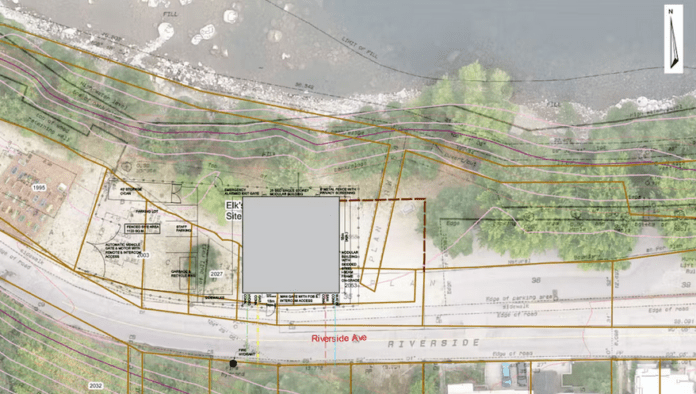BC Housing and the City of Trail are proposing to build a 25-bed homeless shelter on city-owned property at 2039 Riverside Avenue, near the old bridge.
It would replace the existing shelter at 1456 Bay Avenue, whose temporary use permit is set to expire at the end of September.
In a webpage created on the proposal, BC Housing says it is aiming for the new shelter to be open by this winter, although that suggests there will be a gap in service of a few months.
“The development of this new shelter site will reduce the impact of homelessness in Trail, but we recognize shelters are not a solution to homelessness,” BC Housing wrote on the site.
“By relocating to the new location, we can improve site layout, increase services, and connect more people to the support they need. We will continue to work to increase affordable opportunities across the housing spectrum for everyone.”
In addition to providing year-round beds, the shelter would have daily meals, supports, laundry and shower facilities and connections to services. BC Housing plan to use pre-built modular units.
While the details haven’t all been finalized, BC Housing says they expect the facility would have a fenced perimeter with privacy screening, security cameras and lighting, an indoor common area and outdoor space and on-site staff around the clock.
Council will consider a three-year temporary use permit for the project on Aug. 21 at 6 p.m.
A similar proposal for the Gulch was defeated in a vote by city council following pushback from neighbours.
Already council has heard from Riverside Avenue residents who aren’t thrilled about the new location.
Mayor Colleen Jones said the new site is bigger than the one in the Gulch and was previously considered. When council turned down the first location, BC Housing took another look at it.
“The sizing was a challenge,” she said. “They have tried to make sure the trailers will fit on it properly. They’ve done a lot of work to make sure everything is ready to go.”
Jones said it has been very difficult to find a location, adding they still see this as an interim step until supportive housing units can be secured.
“We’re struggling to find any land to make it work,” she said. “We know it’s not a [long-term] solution, but we need something for now.”




